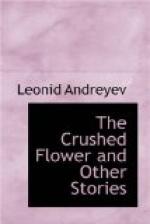Yura got up when all were still sleeping. He dressed himself and jumped out quickly with the expectation of miracles. But he was unpleasantly surprised—the rooms were in the same disorder as usual in the morning; the cook and the chambermaid were still sleeping and the door was closed with a hook—it was hard to believe that the people would stir and commence to run about, and that the rooms would assume a holiday appearance, and he feared for the fate of the festival. It was still worse in the garden. The paths were not swept and there was not a single lantern there. He grew very uneasy. Fortunately, Yevmen, the coachman, was washing the carriage behind the barn in the back yard and though he had done this frequently before, and though there was nothing unusual about his appearance, Yura clearly felt something of the holiday in the decisive way in which the coachman splashed the water from the bucket with his sinewy arms, on which the sleeves of his red blouse were rolled up to his elbows. Yevmen only glanced askance at Yura, and suddenly Yura seemed to have noticed for the first time his broad, black, wavy beard and thought respectfully that Yevmen was a very worthy man. He said:
“Good morning, Yevmen.”
Then all moved very rapidly. Suddenly the janitor appeared and started to sweep the paths, suddenly the window in the kitchen was thrown open and women’s voices were heard chattering; suddenly the chambermaid rushed out with a little rug and started to beat it with a stick, as though it were a dog. All commenced to stir; and the events, starting simultaneously in different places, rushed with such mad swiftness that it was impossible to catch up with them. While the nurse was giving Yura his tea, people were beginning to hang up the wires for the lanterns in the garden, and while the wires were being stretched in the garden, the furniture was rearranged completely in the drawing room, and while the furniture was rearranged in the drawing room, Yevmen, the coachman, harnessed the horse and drove out of the yard with a certain special, mysterious mission.
Yura succeeded in concentrating himself for some time with the greatest difficulty. Together with father he was hanging up the lanterns. And father was charming; he laughed, jested, put Yura on the ladder; he himself climbed the thin, creaking rungs of the ladder, and finally both fell down together with the ladder upon the grass, but they were not hurt. Yura jumped up, while father remained lying on the grass, hands thrown back under his head, looking with half-closed eyes at the shining, infinite azure of the sky. Thus lying on the grass, with a serious expression on his face, apparently not in the mood for play, father looked very much like Gulliver longing for his land of giants. Yura recalled something unpleasant; but to cheer his father up he sat down astride upon his knees and said:
“Do you remember, father, when I was a little boy I used to sit down on your knees and you used to shake me like a horse?”




